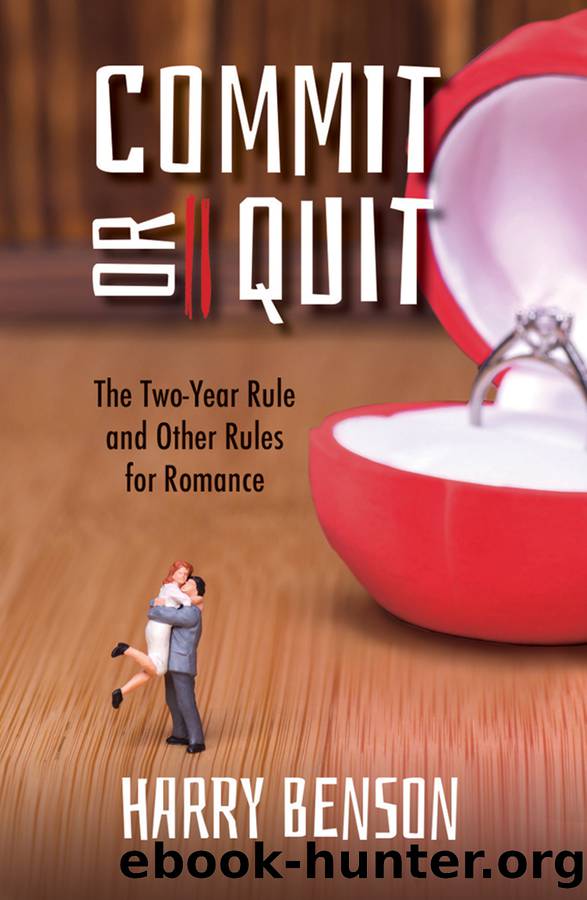Commit or Quit by Benson Harry;

Author:Benson, Harry;
Language: eng
Format: epub
Publisher: Lion Hudson
Published: 2020-03-14T00:00:00+00:00
Asymmetric cohabitation: the new patriarchy?
Sarahâs story is a good example of how society has changed both for better and for worse.
Up until about fifty years ago, there were fewer lone parents bringing up children on their own. Had a lone mother like Sarah met Sam then, moving in together would not have been a serious option. They would have taken time to make their fledgling relationship work, while they established whether or not it was going to lead to marriage.
Since Sam told her early on that it wasnât, even his charm and kindness would have been insufficient to persuade her that the relationship was ever going to be a starter. The fact that he struggled with commitment per se, and not just marriage, may never have come to the surface because the relationship would have ended.
Today, moving in together has almost become a universal presumption. Perhaps Sarah could have held off for longer on the basis that she had a son to worry about. Even then, it would have been hard for her to resist somebody who was clearly kind and putting his best foot forward.
But having won his prize of living with Sarah, Sam backed off and showed his true colours, by which time it was hard for Sarah to ask him to leave.
It then took four years for either of them to overcome the sheer inertia of cohabitation. Thatâs a long time to hang around in a relationship that is going nowhere.
But thereâs a very specific problem that couples face in relationships where one person is more committed than the other.
The more committed partner cares more about the future of the relationship. They are therefore more willing to put their own interests to one side for the sake of the relationship and let things go.
The less committed partner, on the other hand, cares less about the future of the relationship. They are therefore less willing to forgo their own interests.
Whether the relationship succeeds or fails is therefore in the hands of the less committed partner. He or she has the power, the control.
Iâm not sure what word we might use to describe this when itâs the woman who has control. But I do know what we say when a man has control. Itâs called patriarchy.
Itâs one of the ironies of modern culture that we often think of marriage as being patriarchal. Yet asymmetric commitment is relatively rare among married couples. When you have two people with equal lifelong commitments â in theory at least â neither of them has more power over the other.
But what we find in the US studies â and are almost certainly seeing in the UK â is that asymmetric commitment is a lot more common among unmarried cohabiting couples. And in two out of three cases, itâs the man who is less committed and who therefore holds the power.
Today, it is cohabitation â not marriage â where you are most likely to find patriarchy.
Do you love me?
Having said all that, whether male or female, this basic question needs answering.
Download
This site does not store any files on its server. We only index and link to content provided by other sites. Please contact the content providers to delete copyright contents if any and email us, we'll remove relevant links or contents immediately.
Should I Stay or Should I Go? by Ramani Durvasula(6802)
The Lost Art of Listening by Michael P. Nichols(6485)
The Rosie Project by Graeme Simsion(5202)
We Need to Talk by Celeste Headlee(4882)
Beartown by Fredrik Backman(4437)
Suicide Notes by Michael Thomas Ford(4279)
Hunger by Roxane Gay(4237)
Ego Is the Enemy by Ryan Holiday(4005)
I Love You But I Don't Trust You by Mira Kirshenbaum(3236)
Mummy Knew by Lisa James(3176)
Crazy Is My Superpower by A.J. Mendez Brooks(2869)
Girl, Wash Your Face by Rachel Hollis(2830)
The Complete Idiot's Guide to Coping With Difficult People by Arlene Uhl(2825)
Toxic Parents by Susan Forward(2814)
Not a Diet Book by James Smith(2744)
The Hard Questions by Susan Piver(2557)
Name Book, The: Over 10,000 Names--Their Meanings, Origins, and Spiritual Significance by Astoria Dorothy(2499)
The Gaslight Effect by Dr. Robin Stern(2357)
The Social Psychology of Inequality by Unknown(2318)
